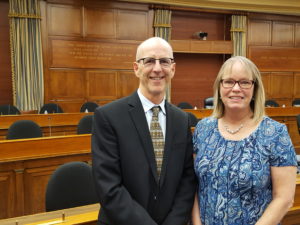Awards Support Innovative Research Collaborations Between Academic Faculty and Regional Bioscience Companies
The Center for Biotechnology at Stony Brook University has announced the recipients of the 2017-2018 Applied Research & Development (ARAD) awards. The ARAD Program is designed to help bridge the gap between the early-stage technology discovery and development capabilities of the academic community, and the later-stage commercial development interests of the bioscience industry.
The program currently provides matching funds on a competitive basis to support collaborations between Stony Brook University faculty and New York State corporate partners in all areas of medical biotechnology. The primary interest is in supporting development of technologies that will help companies hit commercially relevant milestones, and that have the potential to positively impact the New York State economy.
Projects supported this year include the furthered development of an ICU temporary pacemaker, a novel Lymphoma treatment, a novel synthetic peptide based therapeutic for Osteoporosis, further development of an fMRI Dynamic Phantom, development of novel vaccines, third generation taxoid based nanomedicine for chemoresistant cancer, development of a polymeric heart valve, a drug delivery technology for treatment of gastrointestinal diseases, and the development of skin brightening agents.
“The Center’s Applied Research and Development Program speaks to the core of what our organization does – collaborate with New York State companies to help them develop commercially promising technologies that will lead to strategic partnerships, investment, corporate revenues, and job creation” said Diane Fabel, Director of Operations for the Center for Biotechnology. “Our academic institutions are incredible resources for bioscience companies to tap into when it comes to technology development, and promoting interactions between the two helps fuel the overall bioscience ecosystem in the region.”
The ARAD Program is part of a suite of programs and services provided by the Center for Biotechnology (CFB) focused on accelerating the development of biomedical technologies in order to have a positive impact on human health and society. The CFB is also the lead administrative institution for the Long Island Bioscience Hub (LIBH) an NIH-designated Research Evaluation and Commercialization Hub (REACH) established with a National Institutes of Health grant in 2015.
2017-2018 Applied Research and Development Awards
“Synthetic Osteogenic Peptide for Treatment of Osteoporosis” Ajes Life Sciences & Dr. Srinivas Pentyala
“fMRI Dynamic Phantom for Improved Detection of Resting State Brain Networks” ALA Scientific Instruments & Dr. Helmut Strey
“Continued Development of ICU Temporary Pacemaker” Avery Biomedical Inc & Dr. Wei Lin
“Novel Pleiotropic Skin Brightening Agents” Biocogent, LLC & Dr. Sanford Simon
“In vivo Testing of Vaccine Candidates” Codagenix, Inc & Dr. Eckard Wimmer
“A Novel Polymeric Valve for Transcatheter Aortic Valve Replacement” Polynova Cardiovascular, Inc. & Dr. Danny Bluestein
“Imaging the Targeted Delivery of Biologic Agents to the Colon for Local Therapeutic Action” Symbiotic Health Inc. & Dr. Peter M. Smith-Jones
“Eradication of an Oncogenic Herpesvirus as a Novel Intervention for Lymphoma” Theragnostic Technologies, Inc. & Dr. Laurie T. Krug
“Novel Cancer Stem Cell Cytotoxic Agent: Nano-Formulation IND-Enabling Studies” TargaGenix Inc. & Dr. Galina Botchkina
Download a PDF of the press release here.
